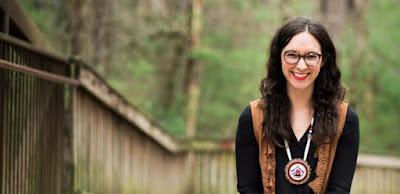 |
| Kaitlin Curtice |
From the very beginning of NATIVE: Identity, Belonging, and Rediscovering God, she makes her intent clear. "We have to remember that physical places are spiritual places. We cannot disconnect the physical from the spiritual, because the spiritual is all around us."
Her deep respect for Creation undergirds everything she writes about in NATIVE. So is a desire to engage oppressed peoples. Curtice quotes Lisa Dougan, "Lasting change comes most assuredly when the oppressed are central agents in addressing the problems they face."
And Curtice is outstandingly to-the-point in her analysis of the challenges we face. "In Western thought, fear and a mentality of scarcity distort our reality. This makes everything an enemy, instead of reminding us that all creatures of the earth, all parts of creation, have roles and abilities that can be manifested to hurt or to heal."
She points to an inclusionary view of faith streams as a solution. "My faith is not a faith to be held over others or a faith that forces others into submission but an inclusive, universal faith constantly asking what the gift of Mystery truly is and how we can better care for the earth we live on, who constantly teaches us what it means to be humble."
There is a contrast offered, between Western (white) Christianity and Native, indigenous (Curtice is a member of the Potawatomi nation) belief. "My partner taught a Christian ethics class a few years ago at a small Christian college, and when they covered Genesis 1, a young man in the class commented that a main responsibility of people is to subdue the earth, as in, overpower and control it by any means necessary. This kind of idea, formed in the belly of toxic masculinity, is passed down generation to generation by Christians who are power hungry, who take advantage of the land and carry on the legacy of their ancestors to take what is not freely given."
As a very young girl, Curtice barely felt the pull between the world of her indigenous ancestors and the Christian church. "But what was happening under the surface was a slow and steady assimilation into Western American Christianity - what I now see as the mix of empire and God that permeates so many white American churches. The problem with the white evangelical church is that assimilation is subtle; when you walk through that sanctuary door, the assumption is that you participate, you oblige, and you don't cause a fuss."
"For so long, I was told to pray only the way the Baptists prayed, to see the world the way American Christians see the world. I was told that the white perspective is the only perspective, but now I have seen from the perspectives of so many. Prayer is a layered, complicated thing, and when we approach it that way, we enter into the mystery of what it is, of what it means to gather in community to choose sacredness around us. Duality, or living in a way that constantly propels us toward one extreme or the other, divides us by binary thinking and it steals our ability to enter into sacredness, making us into people who pray to get a reward, who pray because we are afraid we will be punished if we don't."
Ultimately, Curtice offers a broader view of faith. "If we are to believe that an inclusive love of God is real, we'd better start building a larger [communion] table. If we are truly to hold the space of all tribes and tongues - because the diversity of the world is included in the love of God - we'd better get to work breaking down systems of colonization wherever we find them."
"The problem," writes Curtice, "isn't that we search for the truth; the problem is that we
become obsessed with our belief that we hold the truth, and we destroy entire cultures in the process. This is the tension I experience every time I walk into a church."
What's important in breaking down incessant colonialism, according to Curtice, is the healing found in listening to the Earth, the stories of our ancestors and lamenting over the effects of systematic injustice.
"The ancestors of Potawatomi people were people who watched...To be someone who watches is to be someone who pays attention... Those who keep watch are the ones that no one expects; they are the ones who come with stories to tell because they keep their ears tuned to the mysteries of this world, to the magic of God in her many subversive forms."
In the final chapters of NATIVE, Curtice blends her ideas together towards a solution "Even in an era of the white, American, evangelical church struggling to know itself and face its demons, we hold these institutions accountable for the harm they inflict - and we keep our own hearts soft in the process.. We watch, and then we work. We watch, and then we act... We must act because too many systems have kept oppression spinning endlessly, and if we cannot band together to stop it, no one will."
And this: "We cannot ignore the injustices of our time, but, together we must lean into honest conversations so that together we can move forward, toward healing, toward joy."









